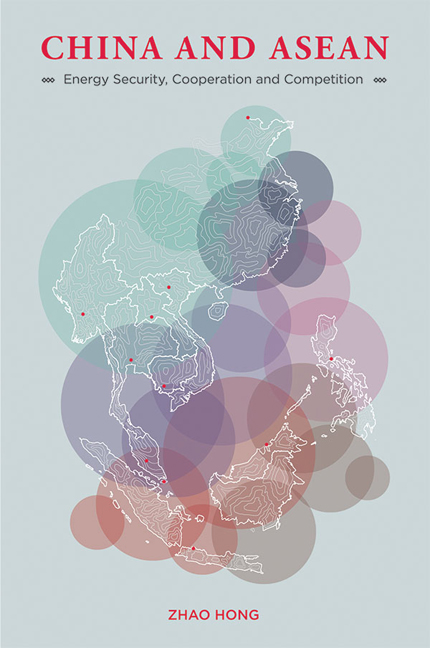Book contents
- Frontmatter
- Contents
- List of Tables and Figures
- List of Abbreviations
- Acknowledgements
- 1 Introduction: China, ASEAN, and the New Global Energy Order
- 2 Economic Growth and Energy Security
- 3 China's Energy Quest in Southeast Asia
- 4 Case Study (1): Myanmar
- 5 Case Study (2): Indonesia
- 6 Energy Resource Competition and the South China Sea Disputes
- 7 Conclusion
- Index
- About the Author
- Frontmatter
- Contents
- List of Tables and Figures
- List of Abbreviations
- Acknowledgements
- 1 Introduction: China, ASEAN, and the New Global Energy Order
- 2 Economic Growth and Energy Security
- 3 China's Energy Quest in Southeast Asia
- 4 Case Study (1): Myanmar
- 5 Case Study (2): Indonesia
- 6 Energy Resource Competition and the South China Sea Disputes
- 7 Conclusion
- Index
- About the Author
Summary
Indonesia is another case example of China's energy relations with ASEAN countries. As the biggest country in Southeast Asia, Indonesia illustrates the diplomatic complexities in its relations with China. Although China has planned to stake a long-term strategic energy investment in the country, the fact that its major trading partner is also seem as a security uncertainty in the region has complicated the resource policies in Indonesia and encouraged domestic resource nationalism. Rising fears that the increasing unbalanced trade relations might affect its national economic security have stirred debates over how Indonesian mineral industries could remain competitive as the country continues its trade ties with Beijing. For the concern of being pulled into China's orbit in a dependent relationship based on supplying raw materials, Jakarta implemented a new law banning the export of unprocessed ore in January 2014. Although the aim is to increase the value added from mineral resources, the new regulations will certainly affect Sino–Indonesian energy cooperation.
OVERVIEW OF ENERGY SECTORS IN INDONESIA
Indonesia is rich in minerals and is in the top ten countries in the world for proven reserves of coal, copper, nickel, tin, bauxite, and coal. Indonesia produces more than 15 per cent of the global nickel supply and 3 per cent of the global copper supply, and it is the world's largest exporter of thermal coal. The total mineral export value more than tripled from US$3 billion to US$11.2 billion in 2013, driven by historically high commodity prices and increasing production. By value, approximately 40 per cent of total mineral export is currently processed; all tin exports are processed, while most copper, nickel, and bauxite exports are unprocessed.
Energy and mineral resources are important sectors in Indonesia's economy. The role of energy and mineral resources to the economy can be observed by three indicators such as its share to the gross domestic product (GDP) and its contribution to economic growth, export, and state revenue. The energy sector has become a buffer of national export and it has made significant contributions to the state revenue, both from tax and non-tax revenue. As seen from Table 5.1, the share of the three main energy sectors in GDP was about 11.5 per cent between 2010 and 2014, and crude oil, gas, and geothermal has the highest share.
- Type
- Chapter
- Information
- China and ASEANEnergy Security, Cooperation and Competition, pp. 142 - 167Publisher: ISEAS–Yusof Ishak InstitutePrint publication year: 2015



